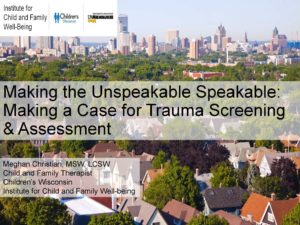Trauma-informed care has increasingly become common nomenclature to social service providers, therapists, researchers, school staff and the general public. To become trauma-responsive, it is essential to conduct trauma screening and assessment so as not to make assumptions, miss vital information, reinforce shame through silence and avoidance, set inappropriate goals and lose rapport with clients. This practice creates many questions for professionals and clients such as why these topics are being explored, how the information will be used and how the process is used as a change maker for families and, at a community-level, policies. Through the process of gradual exposure and developing relationships, authentic client engagement around trauma yields real partnership and voice from those most affected by trauma. Meaningful trauma screening and assessment between interviewer and interviewee is a reciprocal process of empowerment and education that constructs a foundation of frank openness. This foundation then allows for co-creation of informed service goals and treatment design, resilience-building experiences and, ultimately, produces sustainable changes that actually benefits the individual, family, and community.
The Institute for Child and Family Well-Being hosted the webinar “Making the Unspeakable, Speakable: Making a Case for Trauma Screening and Assessment” with Dr. James “Dimitri” Topitzes of UW-Milwaukee’s Helen Bader School of Social Welfare and the Institute for Child and Family Well-being, and Cynthia Franzolin of Sixteenth Street Community Health Centers and Franzolin Consulting Services, LLC.
In this webinar, Meghan Christian discussed with Dimitri and Cynthia:
- How trauma screening and assessment is crucial to service goal setting, diagnostics and treatment;
- The benefits and challenges on the therapeutic relationship;
- Some of the available tools and resources for trauma screening and assessment;
- Guidelines to follow when asking sensitive questions.
Listen to the recorded webinar here.
Related Resources from the ICFW:
- ICFW Video: How Trauma Screening and Assessment Impact Child and Family Well-being
- Differential Diagnosis: Childhood Trauma or Mental Health Diagnosis?
- ICFW Screening and Assessments: Childhood Experiences Survey, Adult Experiences Survey, Lifetime Experiences Survey, T-SBIRT
- Issue Brief: Asking Sensitive Questions
- Issue Brief: Trauma Screening, Brief Intervention, Referral to Treatment (T-SBIRT)
- Issue Brief: Assessing Well-being in Child Welfare
- Webinar PowerPoint Presentation
Referenced websites for more information:


